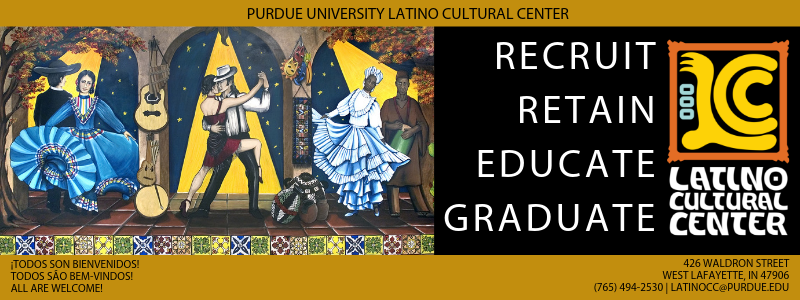
Somos Purdue. We are Purdue.
Mission
The Purdue University Latino Cultural Center creates an inclusive environment for the entire campus community, fostering meaningful dialogue and cultural understanding of Latine & Latin American communities.
About the Latino Cultural Center (LCC)
The Purdue University Latino Cultural Center, established in 2003, provides a welcoming environment where all Boilermakers, regardless of race, can access mentorship, academic guidance, and leadership development while also celebrating Latin American and U.S. Latine culture and traditions. More than a cultural hub, the LCC offers workshops, study spaces and networking opportunities that helps students thrive academically and professionally. Beyond its physical space, the LCC fosters dynamic programming and often collaborates across campus to implement initiatives such as graduate school preparation, career readiness, college completion, study abroad and food insecurity.
For many, the LCC is a home away from home and a place to build comunidad.
On April 11, 2003, we opened our doors with a motto that has stood the test of time. ¡Todos son bienvenidos! ¡Todos são bem-vindos! All are welcome!
History of the LCC
In 2002, a group of students, faculty and staff gathered to discuss the establishment of a center at Purdue University dedicated to Latino cultures. The Black Cultural Center's historical presence on campus paved the way for these efforts. The vision included a physical location, a home away from home for students, faculty, staff and alumni. The LCC would also provide campus-wide programming and a space for scholarly and professional pursuits. LaFaSa and the newly formed LSU sent the Provost a proposal for Purdue University to establish a Latino Cultural Center. With enormous support, Purdue University established the LCC on April 11, 2003 at South Campus Courts, Building B on Harrison Street. The Provost's leadership and dedication enabled the LCC to open with an administrative assistant, student staff, and faculty & staff volunteers. During this year, the development of an LCC identity moved quickly. "Todos Son Bienvenidos" (All Are Welcome) was quickly adopted as a motto to emphasize to the campus community that the LCC was not just for Latinos or for people who speak Spanish, but for the entire campus community.
For almost a year, the LCC successfully functioned without a director and during this period, Día de los muertos and Latino Heritage Month were established as part of the LCC's signature programming. Representative artwork was important to the LCC and Eileen Garcia (MFA '01) was commissioned to create what would become a focal point at the LCC, a mural titled "Latin Dance, Music, Art, and Rhythm", which was completed in the Spring of 2005.
In March 2004, Maricela Alvarado joined Purdue as the inaugural LCC director. Under her tenure, many organizations were institutionalized by the university. Although the Latino Faculty & Staff Association (LaFaSA) at Purdue had been unofficially functioning since 2002, it became an official organization with executive officers in 2005. The Purdue Alumni Association recognized the Purdue Latino Alumni Network (PLAN) in fall of 2004.
In 2006, the LCC was moved to larger, more centralized location at 600 N. Russell Street, a 2,680 SF house. In May of 2017, the Latino Cultural Center moved to 426 Waldron Street, a 2,777 SF house renovated for the LCC.
In May of 2018, a group of graduate students, led by Val Schull and supported by the LCC staff, cultivated the LCC community garden in the new home. In April of 2019, the garden was named Jardín Semillas.
In 2023, the Latino Cultural Center (LCC) partnered with the John Martinson Honors College to establish a Spring Break study abroad program. Students travel to Barranquilla, Colombia, to explore food sustainability and immerse themselves in the region’s rich cultural traditions.